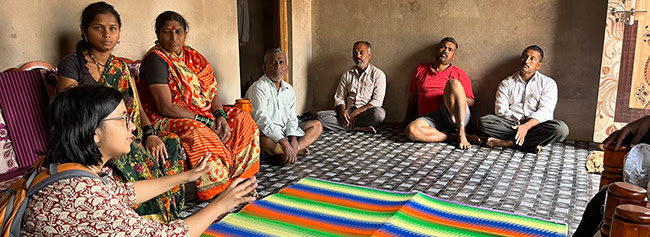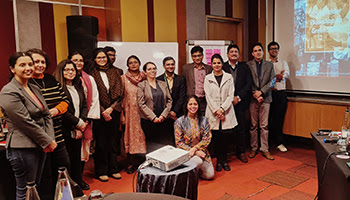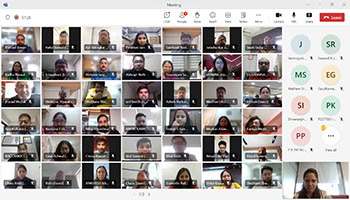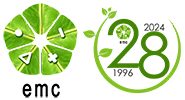Newsletter

EcoPulse
Nurturing a Sustainable Tomorrow

Environmental Management Centre Pvt. Ltd. & Ekonnect Knowledge Foundation
January 2024 | Volume 5 Issue 1
Celebrating 28 Years of Passion for Excellence
We are delighted to announce that EMC celebrated its 28th anniversary on January 4, 2024! Your unwavering trust and partnership have played a pivotal role in our journey of success, and our best is yet to come.
As we step into our 28th year, brace yourself for a transformative journey with EMC 2.0 — an unprecedented leap in our service and engagement models. We’re pushing boundaries like never before and are thrilled to invite you on this remarkable expedition.
A new era is on the horizon. Stay tuned for what unfolds next!
Circular Entrepreneurs: Ekonnect’s Kaleidoscope
Each enterprise, nurtured under Ekonnect’s mentorship, tells a unique story, and within their narratives, lies the promise for a sustainable and inclusive future. The EkoCalendar 2024 serves as an inspiring showcase, planting seeds for a more sustainable, and equitable tomorrow.
Write to Sameer Kulkarni at sameer.kulkarni@ekonnect.net if you want to commence your circular entrepreneurship journey
New Projects
Overview Assessment of the World Bank’s Environmental and Social Framework (ESF) in India
The World Bank has awarded EMC a project to conduct an overview assessment of its Environmental and Social Framework (ESF) in India to understand its alignment with India’s national and state-level environmental and social governance.
The World Bank revamped its Environmental and Social Safeguards in 2016 by structuring its 10 safeguard policies in an Environmental and Social Framework (ESF). The ESF was operationalized in 2018 across the world. EMC’s overview assessment aims to scrutinise the alignment of the ESF with India’s national and state-level environmental and social governance.
Apart from the national environmental and social governance, the study will focus on the laws and regulations in the States of Assam, Tamil Nadu, and Gujarat and examine water, sanitation and health sectors where the requirement of environmental clearance does not apply.
The overview assessment will pave the way for the identification of short, medium, and long-term actions. The idea of the action plan is to enhance alignment, ensure that the application of ESF brings value to funded projects, and hence enhance the development outcomes. Another intended outcome of the overview assessment is to suggest capacity-building measures for key implementing organisations in India.
Download EMC’s report on “Effectiveness of EIA in India”. This is a World Bank publication, and although dated, this gives messages that are applicable even today.
An Indian Passenger Airline hires EMC for mainstreaming sustainability in their branding
EMC has been appointed by a passenger airline in India to guide them in its efforts towards mainstreaming sustainability in its business strategy, processes and operations and thereby influence the customers. The scope of this assignment also includes preparing an ESG Roadmap to help the airline achieve its sustainability goals.
Read Dr Prasad Modak’s fun blog “Up in the Air” to get more insights about how airlines are making efforts to mainstream sustainability as a brand in their business.
But would you prefer to fly on an airline because it is more sustainable?
Environmental & Social Impact Assessment (ESIA) for a 22 MWp solar project in Thoothukudi, Tamil Nadu
Environmental & Social Impact Assessment (ESIA) typically involves a combination of desk-based review, use of remote-sensed imageries with application of Geographic Information System (GIS), and on-site ecological and social surveys. The primary objective of this assessment is to identify key environmental and social risks and impacts associated with the solar project and come up with an environmental and social action plan (ESAP).
Are solar energy projects environmentally and socially benign? Read the article by Sharvari Lowalekar and Prasad Modak to understand a different perspective
Environmental and Social Due Diligences for Investors
EMC received a mandate to conduct Environmental and Social Due Diligences (ESDD) of their investee companies from several investors.
LeapFrog Investments Group Ltd. from the UK has entrusted EMC with an ESDD for a financial institution in India.
Multiples Alternate Asset Management Pvt. Ltd. has engaged EMC to conduct an Implementation Audit of the Environmental and Social Management System (ESMS) of two portfolio companies.
Siana Capital Management LLP commissioned EMC to carry out ESDDs of two investee companies in view of Siana’s potential investment.
Shouldn’t the scope of ESDD include Opportunity Assessments and even beyond? Listen to EMC’s unique 7C approach.
EMC bags study on Industrial Decarbonization Market for Cambodia’s Key Manufacturing Sectors for the World Bank/IFC in partnership with BDO Cambodia
Cambodia is among the energy-intensive countries in the East Asia Pacific region. The Cambodian government has issued a National Energy Efficiency Policy for the period of 2022-2030, which set an ambitious target of reducing energy consumption by at least 19% by 2030. This policy focuses on major economic sectors such as commercial buildings, industrial parks, rice milling, beverages, brick production, cement, rubber production, and others.
This market assessment will be based on a combination of desk research and interviewing/consultations focusing on decarbonization-related initiatives taken by the private sector.
EMC assists an Indian multinational consumer goods company with responsible sourcing
An Indian multinational consumer goods company providing consumer products and services in the areas of health, beauty and wellness, commissions EMC to help in responsible sourcing and sustainable practices.
The project’s scope includes strengthening the company’s responsible sourcing code, establishing evaluation criteria and conducting field audits based on established frameworks. In addition, EMC will develop a comprehensive Standard Operating Procedure (SOP) to ensure zero deforestation.
Read More about Responsible Sourcing (Add as a section dropdown – expand and minimise functionality)
Responsible sourcing refers to the ethical and sustainable practices involved in procuring goods and services from suppliers. It is a commitment by businesses to ensure that the products they acquire are produced or provided in a manner that aligns with social, environmental, and ethical standards. The goal is to minimize negative impacts on people, communities, and the environment throughout the supply chain.
Key aspects of responsible sourcing may include:
- Ethical Labour Practices: Ensuring fair wages, safe working conditions, and compliance with labour laws for workers involved in the production of goods.
- Environmental Sustainability: Minimizing the environmental impact of sourcing activities, such as reducing carbon emissions, managing water resources responsibly, and minimizing waste.
- Human Rights: Upholding human rights and preventing any form of exploitation, discrimination, or violation of basic human rights within the supply chain.
- Transparency and Traceability: Providing transparency about the origin and production processes of products, allowing consumers to make informed choices and trace the supply chain.
- Community Engagement: Engaging with local communities and respecting their cultural, social, and economic rights, particularly in areas where sourcing activities take place.
- Legal Compliance: Ensuring compliance with local and international laws and regulations, including those related to labour, environmental protection, and human rights.
- Supplier Relationships: Building strong relationships with suppliers based on trust, collaboration, and shared commitment to responsible practices.
Companies that prioritize responsible sourcing aim to contribute to sustainable development, promote social justice, and minimize the negative impact of their operations on the planet. Many organizations develop and implement responsible sourcing policies and codes of conduct to guide their actions and hold themselves accountable for their supply chains’ social and environmental aspects.
Contact Dr Asha Panwar, Assistant Vice President, EMC, at asha.panwar@emcentre.com to learn more about EMC’s service on responsible sourcing.
Empowering Sanitary Supervisors with Waste Management Training
EMC conducted a training workshop on waste management for sanitary supervisors and inspectors on behalf of the Centre for Environment Education. The workshop, held in Haridwar, Uttarakhand, aimed to enhance the knowledge and practices of sanitary supervisors for sustainable waste management. This workshop was conducted in Hindi by Mr Prahlad Tewari and Mr Nilay Srivatsava from EMC.
The workshop covered topics such as health and safety standards, sanitation processes, waste management rules, the importance of source segregation, and collection strategies, showcasing improved and innovative sustainable waste management practices.
The workshop was well received and was highly appreciated by the participants.
Reshaping Circular Economy Landscape of the Angul District, Odisha (Phase-1)
Embarking on a groundbreaking initiative, the “Programme on Circular Economy in Angul District of Odisha; Phase-1” is set to redefine sustainability. Funded by the United Nations Office for Project Services (UNOPS) and UNEP, this 1.5-year endeavour focuses on integrating circular economy approaches into priority sectors in Angul, Odisha.
The project activities include a comprehensive situation analysis to assess the circularity gap, the development of an action plan, and the establishment of monitoring frameworks. The initiative also aims to identify pilot projects, deploy subject matter experts, and create a Center of Excellence on circularity.
Further, the project involves the development of a dedicated webpage and provides technical support for conferences, along with extensive outreach and communication activities, including training workshops for stakeholders in circular economy practices. The overarching objective is to craft a pioneering district-level road map for a circular and inclusive green economy, setting a precedent for sustainable development.
Megha Roy’s abstract of the research paper titled “Emerging Regimes of Dispossession: Impacts of Solar Energy Projects on Indian Land Governance’” is accepted at the International Conference on Global Land Grabbing in Colombia

Ms Megha Roy, our Social Development Specialist at EMC, is set to present her research paper titled ‘Emerging Regimes of Dispossession: Impacts of Solar Energy Projects on Indian Land Governance’ at the International Conference on Global Land Grabbing in March 2024, organised by the Land Deal Politics Initiative (LDPI) in Bogota, Colombia.
To learn more about LDPI, please visit the website.
Workshops

Transforming Vocational Education with Green Skills: Stakeholder Workshop Unveils Progress
The second Stakeholder Workshop under the ongoing Green Skills Project was successfully conducted in Delhi on December 21, 2023. Aligned with the Indo-German Initiative Towards Technical Education (IGnITE), this project focuses on enhancing energy efficiency, resource efficiency, and waste management skills across five trades: fitter, electrician, electronics mechanic, turner, and machinist.
Hosted in collaboration with esteemed institutions such as the Directorate General of Training (DGT), Amrita Engineering Entrance Examination (AEEE), Council on Energy, Environment and Water (CEEW), The Energy and Resources Institute (TERI), Alternatives Futures, and International Labour Organization (ILO), the workshop played a pivotal role in shaping the comprehensive green skill curriculum integrated into vocational training at Industrial Training Institutes (ITIs).

Resource Efficiency Basic Course, the roadmap to leveraging ESG to a Net Zero future, curated by seasoned experts
Curated by Ekonnect Knowledge Foundation, coordinated by TERI School of Advanced Studies, and supported by Emerson Electric Company, the course successfully delivered a comprehensive understanding of sustainability, enriched by real-world applications.
The virtual course, facilitated by the resource persons at EMC, commenced with Day 1 focusing on Circular Economy and Resource Efficiency. Presenters included Dr Prasad Modak, Mr Prahlad Tiwari, Dr Shilpi Kapur, and Mr Nilay Srivastava.
On Day 2, Dr. Asha Panwar and Mr. Tejas Chowdhary delivered a presentation on ESG and its multifaceted layers. Day 3 centered on Net Zero and Decarbonization, with Ms Sivaranjani
Subramanian and Mr Jay Mehta simplifying this complex subject for the audience.
The course garnered significant interest with 145 participants, including 33 students representing institutions such as IITs, KPMG, UNDP, Kotak Mahindra Bank, Piramal Pharma, ICICI Foundation, and Reliance Retail, among others.
As we look ahead, the Advanced Course is scheduled from January 31 to February 2, 2024. This upcoming session will explore tools for achieving Resource Efficiency, practical approaches for industries to achieve Net Zero, and insights into ESG Indicators, Rating Frameworks, Disclosures, and Access to Finance for implementing resource efficiency measures.
Additionally, stay tuned for Ekonnect’s exciting lineup of virtual and in-person training programs set to launch this year!
Featuring EMCians
At EMC, we cherish our relationship with our alumni, including interns, and continue to stay connected on a WhatsApp group, ‘EMCians’, which now has more than 140 members. We are pleased to introduce some of our alumni as a part of the EMC-Ekonnect newsletter.
From EMC, Gauri moved on to work as an environmental planner at VK:e for a while, after which she kickstarted her career as a User Experience Architect. Moving through companies as a UX Designer, Gauri landed a job at her present employer, State Farm. Here, Gauri has climbed up the ladder over almost 8 years, from working as a UX Architect to a Digital Experience Architect today. EMC is happy to have been a part of her journey that transitioned from designing and enabling physical spaces to doing the same and more in the virtual world.
After projects with EMC in ESG, Circular Economy, and Entrepreneurship, Aneesa worked with Peak Sustainability Ventures as an Analyst and Consultant, emphasizing sustainability and start-ups. Now, she owns a business crafting eco-friendly pet products, and she also leads programs at The Sustainability Mafia.

